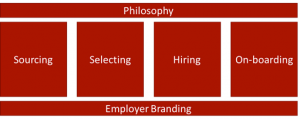So, you’re starting a new job. Congratulations! You’ve survived various interview rounds and proved your mettle. You’ve convinced the hiring manager that you are awesome and claimed a flat pack desk at the company of your dreams (hopefully). But this is no time to be resting on your laurels. No, this is just the beginning.
You’re in the door but you’ve still got a whole lot of impressing to do. As a new employee, people will be watching you, sizing you up, deciding your worth. Make sure you rise to the occasion with these tips.
Behave as if you’re still being interviewed
Because you kind of are. In the interview, you talked the talk, now it’s time to walk to the walk – or code the code or market the marketing or whatever it is you do. You need to deliver on everything you promised in the interview – and more, ideally. Whoever hired you will be waiting to see if they made the right decision. Of course they did: you’re great. Now show them.
Introduce yourself to coworkers
Don’t wait for your colleagues to come to you. Be proactive and take the time to go round and meet the people you will be working with. People will appreciate you making the first move and picking when and where to introduce yourself also gives you more control over the all-important first impression.
Organise yourself from the very beginning
You know what they say: Start as you mean to go on. Getting into good habits when starting a new job is much easier than trying to change things up further down the line when you have already settled into a certain way of working. Think about ways you could have been better organised in the past and how you can improve on that now that you have a fresh start.
Figure out what is expected of you
Arrange a meeting with your new boss in which you make sure his or her expectations for your role are very clear. This should cover schedule, office culture, duties, targets and timeframes. You should also do this in a less formal way with your colleagues. Spend some time with them to figure out the office’s dynamic.
Watch and learn
Every workplace is at least a little bit different. In your first couple of weeks, you should watch carefully to see how things are done. Adapt your working processes to those of your new company. No one likes to hear “Well, we did it like this at my old company” from a new colleague. If you have genuinely helpful suggestions to make, wait until you have been around for a few weeks, and even then, make them diplomatically.
Take notes
You are bound to be bombarded with information when you start a job and there’s no way you’ll remember unless a) you’re Rain Man or b) you write it all down. Everything. It might seem a bit tedious, but there will undoubtedly come a point when you’ll need those notes. Write down who does X, who you need to speak to about Z and how to do Y.
Ask plenty of questions
You’re not expected to know everything, so don’t be afraid to ask questions. In fact, it’s better if you do. Asking the right kind of questions (the kind that dive right into the heart of your new role) show that you are engaged and motivated to make an impact. Ask about your team’s current focus and goals, so that you can properly understand and contribute to them.
In addition, it’s more than ok to ask more mundane questions, such as procedural queries or who to speak to when you need something. Hopefully, things like this will be explained in your onboarding process, but if they are not, it’s much better to just ask.
Help people out
Don’t fall into the trap of thinking that, because you’re new, people should be helping you. If you see someone struggling with a task or with their workload, offer to help out. Even if they decline, they’ll still appreciate the offer. Helping out your colleagues wherever possible will give you a good standing in the office, and if you really do need some help, they’ll be likely to return the favour.
The only caveat is to make sure that you get your own work done as well. Otherwise, your efforts could count for nothing.
You should make sure that colleagues don’t start thinking that they can just dump their workload onto you, though. If that happens, it will be hard to stop without winding people up. To avoid that situation, be more than happy to help your colleagues complete a task, but don’t take an entire task off their hands – or you’ll be setting a precedent.
Be yourself
Although much of this advice has focused on fitting in and adapting to your new workplace, it’s important to retain your individuality. After your boss must have liked something about you; he hired you. It’s good to express your personality within a team. You could put it across in the way you write your emails or by decorating your workspace.
Follow the unwritten rules
While your company will have hard and fast rules like a dress code or a time everyone should be in the office, it’s just as important to figure out and abide by the more nebulous unwritten rules of the office. How is the washing up handled? When do people go for lunch? Where can you keep your food? Which coffee mug shouldn’t you use? Paying attention to these (seemingly) small things is vital to fitting in with your new coworkers.
Learn from the best
It should become apparent fairly quickly who the best-performing employees are in your team. Watch them in order to figure out what it takes to be the best in that company. Look at what they do that others don’t so that you can do it too (and then bask in glory).
Make your boss (and your team) look good
Don’t worry too much about who gets the credit if you come up with a creative solution to a tricky problem or a great new strategy. Instead, be happy that your output will let your boss and coworkers shine in the organisation. You’ll build up a lot of goodwill.
Make yourself look good, too
The best way to do this is by delivering on the promise you showed in your interview. If you specifically mentioned how good you are at something, now is the time to show it. Get to work on whatever you said you can help the company with and make sure you show results. Keep track of everything you are doing and the impact it is having. Being able to back yourself up with numbers will also be good when your performance review rolls around.
Take on the difficult tasks
There are a couple of benefits to this. Firstly, the boss will see you as someone to rely on. Secondly, you can distinguish yourself by doing a good job and learn along the way. Thirdly, your colleagues will be glad they don’t have to do it.
Socialise with your colleagues
If your colleagues do things together outside of work, whether it’s a company-sponsored activity or an informal get-together, join in. You can build and improve your relationships with your coworkers, meaning you’ll also work together better when you’re back in the office.
In many ways, the start of a new job is more stressful than the interview process. There are a lot of sets of eyes on you when you’re the new guy or girl, but if you follow these tips, you don’t need to worry and can focus on enjoying your new role.
And, if you make a really good impression at the beginning, this will be your reward:
Business & Finance Articles on Business 2 Community
(82)
Report Post





